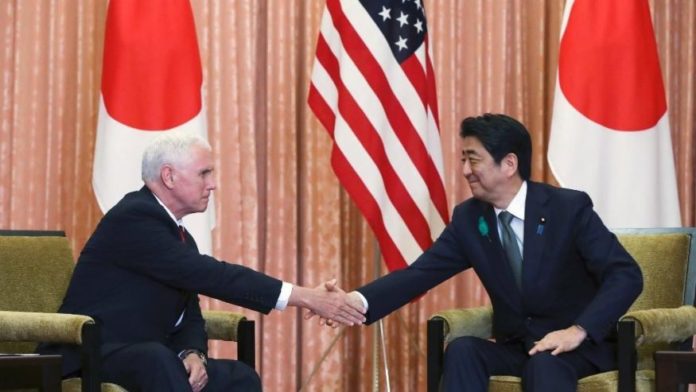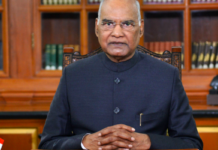
U.S. Vice President Mike Pence reassured Japan of American commitment to reining in North Korea’s nuclear and missile ambitions on Tuesday, after warning that U.S. strikes in Syria and Afghanistan showed the strength of its resolve.
Pence arrived in Tokyo from South Korea, where he assured leaders of an “iron-clad” alliance with the United States in the face of the reclusive North, which has conducted a series of missile and nuclear tests in defiance of U.N. sanctions.
North Korea regularly threatens to destroy Japan, South Korea, and the United States and it showed no let-up in its belligerence after a failed missile test on Sunday, a day after putting on a huge display of missiles in Pyongyang.
“The era of strategic patience is over and while all options are on the table, President (Donald) Trump is determined to work closely with Japan, with South Korea, with all our allies in the region and with China to achieve a peaceable resolution and the denuclearization of the Korean peninsula” Pence said in Tokyo before lunch with Prime Minister Shinzo Abe.
“We appreciate the challenging time in which the people of Japan live with increasing provocation across the Sea of Japan. We are with you 100 percent,” he said.
Pence and Abe agreed that they needed to persuade China to play a larger role in dealing with North Korea, a Japanese government spokesman said.
North Korea’s deputy representative to the United Nations, Kim In Ryong, accused the United States on Monday of creating “a situation where nuclear war could break out any time” and said the North’s next nuclear test would take place “at a time and at a place where our headquarters deems necessary”.
North Korea’s Vice Foreign Minister Han Song-Ryol told the BBC that missiles would be tested on “a weekly, monthly and yearly basis”.
South Korea’s acting president, Hwang Kyo-ahn, told a cabinet meeting on Tuesday that South Korea would strengthen its alliance with the United States and closely cooperate with China to rein in North Korea.
“We should stay on our toes to protect our territory and people’s lives,” Hwang said.
The North has warned of a nuclear strike against the United States if provoked. It has said it has developed a missile that can strike the mainland United States, but officials and experts believe it is some time away from mastering the necessary technology, including miniaturizing a nuclear warhead.
TOUGHER SANCTIONS
Pence said on Monday the world had seen Trump’s resolve in the past two weeks, with a U.S. missile attack on a Syrian airfield and the dropping of a powerful non-nuclear bomb on Islamic State fighters in Afghanistan.
“North Korea would do well not to test his resolve or the strength of the armed forces of the United States in this region,” Pence said.
The Trump administration has said military action remains an option for dealing with North Korea.
But, mindful that this would likely trigger massive retaliation and casualties in South Korea and Japan, U.S. officials say the Trump administration’s main focus is on tougher economic sanctions.
Trump, asked on Monday if he was considering military action, told Fox News Channel he did not want to “telegraph” his plans like the previous administration had done.
U.S. officials say tougher sanctions could include an oil embargo, a global ban on North Korea’s airline, intercepting cargo ships and punishing Chinese banks doing business with Pyongyang. They also say greater Chinese cooperation is vital.
White House spokesman Sean Spicer said China had taken some “very helpful” steps, although it remained to be seen how effective these would be.





















